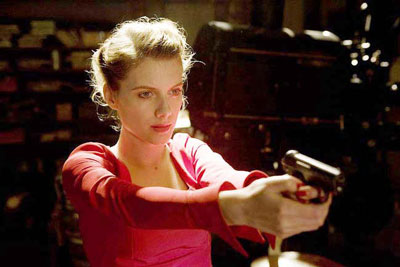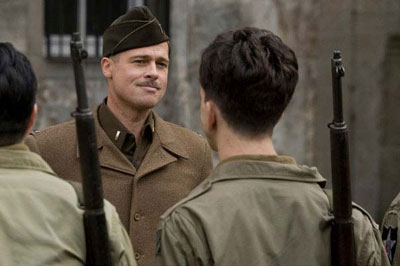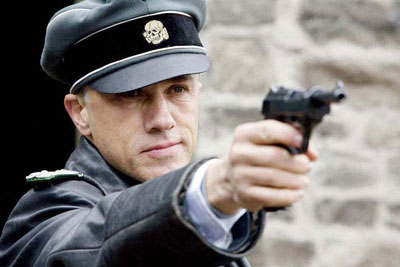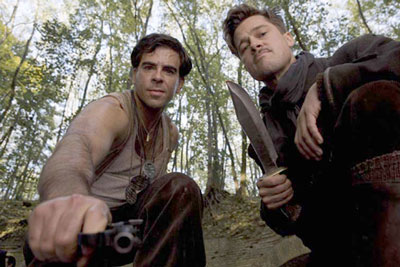
Inglourious Basterds
directed by Quentin Tarantino
starring Brad Pitt, Melanie Laurent, Christoph Waltz, Diane Kruger
Universal
Quentin Tarantino is a guilty man.
Guilty of operating a shell game, of performing sleight-of-hand on an unsuspecting, captive audience.
Guilty of orchestrating a cinematic bait-and-switch on a grand scale.

From watching the trailers for Inglorious Basterds, one with a passing knowledge of film history – and of Mr. Tarantino’s previous work – could easily infer that his new WWII epic is an updated, ultraviolent, skewed version of say, The Dirty Dozen or Kelly’s Heroes. To the Tarantino fan, a movie about a Bowie knife-totin’, direct descendant of Jim Bridger (Brad Pitt) leading a pick-up squad of Jewish soldiers on a mission to gleefully whack a bunch of Nazis in pre-D-Day France is a bit salivating.
Tarantino is counting on you making this reasonable assumption, like an angler flashing a shiny lure in front of an unsuspecting bass. The reality is, that ingenious commercial pretty much contains every scene the scalp-takin’ Basterds are in; watching another two hours and twenty-nine minutes of filler is unnecessary. You see, Inglourious Basterds is really about a French farm girl-turned theater owner/operator (Melanie Laurent) who stumbles upon an opportunity to avenge her slaughtered family.

The film’s namesake – almost completely devoid of character development – is not even the common element, the glue keeping this dud grenade together. That role is left to actor Christoph Waltz, whose Waffen-SS Colonel Landa, “the Jew Hunter,” almost saves Tarantino’s bacon. Waltz is a tour de force as a dyed-in-the-wool classic villain, a cunning, ultra-courteous predator with a cat-and-his-canary smile.
A two-out-of-three combination of Waltz, Pitt, or Laurent would have been a winning formula. Remove the Basterds’ almost-token presence, re-allocate their too-brief screen time to the hunter-and-the hunted storyline, and bingo! you’ve got a really engrossing movie. Erase Laurent, or reduce her role to a memorable incidental character, and voila! there’s that revamped Dirty Dozen scenario Tarantino teases us with.

Instead, the director has presented his loyal fans with a screwy, infuriating mess that – Col. Landa’s presence aside – is almost as godawfully boring as the first half of Death Proof. Yes, one of Tarantino’s trademarks is intertwining storylines, but it just doesn’t work here; laborious scenes come off as abandoned or discarded in the end, rather than stepping-stones in the plot.
Adding insult to injury, Inglourious Basterds resembles a schizophrenic film student’s project reel, a bewildering array – not a blend – of influential styles. The film begins as a spaghetti western (surprise, surprise) set in WWII, complete with theme music; then, it turns into a War-era Hitchcock thriller. Up next, a vivid, lingering series of Lynchian scenes, then some Peckinpah and de Palma. On and on the Tarantino Self-Indulgent Express meanders, to a jumbled aburdist-fantasy climax.
Quite frankly, the movie doesn’t deserve any more commentary than this. Watch it at your own risk of regret.

With Inglourious Basterds, Tarantino has used his well-deserved Get Out of Jail Free card. His next offering had better be a winner, or at least a film that’s more respectful of its audience.
Or else.
Inglourious Basterds: http://inglouriousbasterds-movie.com/












